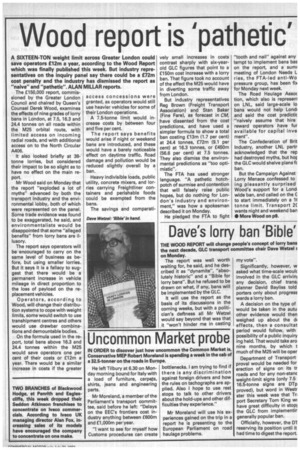Wood report is 'pathetic'
Page 5

If you've noticed an error in this article please click here to report it so we can fix it.
A SIXTEEN-TON weight limit across Greater London could save operators 02m a year, according to the Wood Report which was finally published this week. But industry representatives on the inquiry panel say there could be a £72m cost penalty and the industry has dismissed the report as "naive" and "pathetic". ALAN MILLAR reports.
The £150,000 report, commissioned by the Greater London Council and chaired by Queen's Counsel Derek Wood, examines the effects of nine grades of lorry bans in London, at 7.5, 16.3 and 24.4 tonnes on all roads within the M25 orbital route, with limited access on incoming radial roads, and with additional access on to the North Circular A406.
It also looked briefly at 38tonne lorries, but considered their impact to be so slight as to have no effect on the main report.
Mr Wood said on Monday that the report "exploded a lot of myths" advanced by both the transport industry and the environmental lobby, both of which were represented on the panel. Some trade evidence was found to be exaggerated, he said, and environmentalists would be disappointed that some "alleged benefits" from lorry bans are illusory.
The report says operators will be encouraged to carry on the same level of business as before, but using smaller lorries. But it says it is a fallacy to suggest that there would be a permanent increase in vehicle mileage in direct proportion to the loss of payload on the replacement vehicles.
Operators, according to Wood, will change their distribution systems to cope with weight limits, some would switch to use transhipment centres and others would use drawbar combinations and demountable bodies.
On the formula used in the report, total bans above 16.3 and 24.4 tonnes within the M25 would save operators one per cent of their costs or £12m a year. There would be a similar increase in costs if the greater access concessions were granted, as operators would still use heavier vehicles for some of their London operations.
A 7.5-tonne limit would increase costs by between four and five per cent.
The report says benefits would arise if night or weekend bans are introduced, and these would have a barely noticeable effect on daytime traffic. Road damage and pollution would be reduced slightly overall by a ban.
Heavy indivisible loads, public utility, concrete mixers, and lorries carrying Freightliner containers and perishable foods could be exempted from the bans.
The savings and comparati vely small increases in costs contrast sharply with six-yearold GLC figures that point to a £150m cost increase with a lorry ban. That figure took no account of the effect the M25 would have in diverting some traffic away from London.
But industry representatives Reg Brown (Freight Transport Association) and Stan Baker (Fine Fare), as forecast in CM; have dissented from the cost ;predictions, and have used a simpler formula to show a total ban costing £13m (1.7 per cent) at 24.4 tonnes, £72m (9.1 per cent) at 16.3 tonnes, or £450m (56.6 per cent) at 7.5 tonnes. They also dismiss the environmental predictions as "too optimistic".
The FTA has used stronger language. "A pathetic hotchpotch of surmise and contention that will falsely raise public hopes, but do nothing for London's industry and environment," was how a spokesman described it on Monday.
He pledged the FTA to fight "tooth and nail" against any tempt to implement bans bas on the report, and a sumr meeting of London Needs L ries, the FTA-led anti-Wo pressure group, has been fbo for Monday next week.
The Road Haulage Assoc tion, which also is represeni on LNL, said large-scale lo bans would not help Lon& and said the cost predictic "naively assume that hire reward operators have fur available for capital inve ment".
The Confederation of Brit Industry, another LNL partr acknowledged that the rep had destroyed myths, but hor the GLC would shelve plans fc ban.
But the Campaign Against Lorry Menace confessed to ing pleasantly surprised Wood's support for a Lond wide ban, and called on the C to start immediately on a 1( tonne limit, Transport 2C wants night and weekend ban • More Wood on p9.




















































































